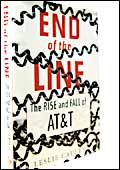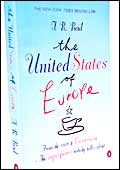 |
END OF THE LINE
By Leslie Cauley
Free Press
PP: 301
Price: Rs 1,170 |
Not too long
ago, wired, one of the few magazines that believes that form matters
as much as content (it really does, for magazines), carried a
large infographic on AT&T (Ma Bell), the Baby Bells that it
was forced to break itself into, the incestuous M&A play the
babies indulged in, and the eventual acquisition, in March 2005,
of AT&T by one baby SBC Communications (it started life as
Southwestern Bell). For Americans like Leslie Cauley, a telecom
journalist, AT&T is more than a company; it is a part of the
history of the United States (and since the country itself is
fairly young, a vintage of a few hundred years or so, Americans
are obsessed with what little history they have). "It's my
way of giving homage to a great company and a uniquely American
institution," says Cauley in the introduction to End of the
Line, and while that admission initially filled this reviewer
with trepidation that the author was going to embark on one of
those great-company-greater-CEOs eulogy of the kind that dominates
business writing these days, such fears were put to rest quickly.
Then, it is difficult to say anything charitable about a company
and a succession of CEOs that, er, messed things up. Cauley's
book, while suffering from an ailment that afflicts most books
written by journalists-the breed has problems going back and forth
in time while writing about a company in a 500-word anchor or
a five-page feature; imagine what would happen in a 300-page book-sums
up AT&T's problems (and their makings) pretty accurately and
insightfully: financial recklessness, a series of strategic blunders
culminating in $62 billion acquisition (of MediaOne) that went
horribly wrong, a succession of CEOs that did nothing to diversify
into other, promising businesses, and a desire to match the numbers
of upstart WorldCom, numbers that couldn't be matched, it later
turned out, simply because they weren't real. If this reviewer
has his way, End of the Line would become compulsory reading for
executives at India's largest telcos (think Bharti Tele-Ventures,
Reliance Infocomm, Hutch-Essar) and the bureaucrats who call the
shots in state-owned telecom monoliths such as BSNL and MTNL.
Just under the surface of Cauley's tale is another, more intriguing
one, of the future of a business where voice-calls to any part
of the world (let's not forget that AT&T's core business was
long-distance telephony) will soon be free. End of the Line is
best read between the lines.
 |
THE UNITED STATES OF EUROPE
By T.R. Reid
Penguin Press
PP: 305
Price: Rs 1,168 |
SUPER STATE
The end of the cold
war in 1991 and the subsequent disintegration of the Soviet republic
had left an obvious gap in the new world order: while the United
States continued to be the dominant country, there was no one
nation that could fill in for the erstwhile USSR. There were concerns
that the US, left without any challenger to its authority, would
become the global cop: omnipotent and arrogant. Some will argue
that it has, but as made evident by the US-European (minus the
UK) divide over the war in Iraq, countries in Europe have ably
emerged as a counterbalance to the American power. They have done
so not individually but collectively, says Reid, former head of
The Washington Post's London bureau. In this insightful work,
he explains how and why the United States of Europe emerged right
under America's nose, and the superpower seemed not to care. Now,
of course, it must. The 25-member European Union is not just an
association of countries but also a unified market that's simply
too big to ignore. Best of all, the EU countries don't have foreign
policies that are anywhere near as messy as America's.
|





